Discover What You Say in English!
What You Say in English!

What You Say in English!
Author: Frank Carrizo Zirit
Subscribed: 116Played: 2,572Subscribe
Share
© Frank Carrizo Zirit
Description
It's a weekly podcast where I listen to you and give you my professional feedback on how you use grammar, vocabulary, discourse, and pronunciation. I will also share some tips and ideas with everyone out there who wishes to improve on their speaking. Go to the companion website: http://whatyousayinenglish.wordpress.com, check the questions of the month to get started. Be brave! Send your recordings to podcast@languageteaching.es. Support this podcast: https://anchor.fm/whatyousayinenglish/support
121 Episodes
Reverse
As promised, a series of minicasts with an English expression (or expressions) that you can use in your everyday life or during a speaking test. You can download the transcript here.
---
Send in a voice message: https://anchor.fm/whatyousayinenglish/message
Support this podcast: https://anchor.fm/whatyousayinenglish/support
A sword is a fantastic weapon. It can cause admiration and terrible fear in people. Maybe that's why we've coined so many expressions with it. Today, you'll learn three fantastic ways in which you can use it during speaking exams. As in the previous minicast, download the transcript from here.
---
Send in a voice message: https://anchor.fm/whatyousayinenglish/message
Support this podcast: https://anchor.fm/whatyousayinenglish/support
Who doesn't want more knowledge? Today I'm bringing three wonderful expressions with the word knowledge. One of them, knowledge is power, even has a funny story of a guy who misunderstood it until he was an adult. Read more about this by following this link.
As always, this minicast has a transcript that you can download from here.
---
Send in a voice message: https://anchor.fm/whatyousayinenglish/message
Support this podcast: https://anchor.fm/whatyousayinenglish/support
Today's minicast is rather musical, because of the references I'm using, but all three idioms actually come from the sports world. As usual, I open with some real-life examples and tell you how you can use them in your everyday life and during speaking exams. The transcript can be downloaded from here.
---
Send in a voice message: https://anchor.fm/whatyousayinenglish/message
Support this podcast: https://anchor.fm/whatyousayinenglish/support
Today, I'm bringing some American expressions that have been used worldwide. And they come from the time when the United States of America became independent from Great Britain, and the original 13 colonies expanded to the west. As usual, the transcript can be downloaded from here. How do you like these minicasts? Send your opinions to podcast@languageteaching.es
---
Send in a voice message: https://anchor.fm/whatyousayinenglish/message
Support this podcast: https://anchor.fm/whatyousayinenglish/support
Ok, so here's the situation...
You've been trying to improve your speaking for so long. The problem is, that you can't always find someone who can help you with it, especially when feel you need to work harder to make yourself understood.
Or like when you go into a store and ask for something, and the salesperson comes back with something completely different, and then you realized that it was because they didn't get what you meant to say. While it may be true that that person's understanding of English isn't up to a good international standard, it could also be because the way you said it wasn't clear enough.
Sometimes it gets even worse, you've been saying something in such a way that others understand, but no one has been kind enough to correct.
This is where I step in.
My name is Frank, and I've been working as an English teacher for more than 20 years and as a speaking examiner for more than 5. Every week, I will listen to what you say in English and let you know what you're doing great, and what you will probably need to improve on. I will cover areas such as use of grammar, vocabulary, discourse, or pronunciation. And how can I listen to what you say in English? Easy, just go to my website: whatyousayinenglish.wordpress.com, check the questions of the month and select the activity according to the level you feel more comfortable in. Then, go over to send your recording, and voilà! You'll be featured in one of the episodes! I will try to give you meaningful and useful feedback which you can use to your advantage. Especially if you have an exam like IELTS, TOEFL or Cambridge to prepare for.
Even if you don't want to send in your recording, tune in every week to listen to others receive advice and tips to improve on their speaking. I'm sure you'll find something useful.
And what can you do now? Subscribe to my podcast here on Anchor or any other podcast service where it's available. I'll be happy to listen to what you say in English!
---
Send in a voice message: https://anchor.fm/whatyousayinenglish/message
Support this podcast: https://anchor.fm/whatyousayinenglish/support
In the first episode, I wanted to cover some of the basic concepts to understand the type of feedback I give to my students. I will cover other ideas as what we look at when we analyze grammar in speaking in the broader concept of English as a Lingua Franca (ELF)
Useful resources:
The CEFR (The Common European Framework of Reference for Languages)
The ACTFL (American Council on the Teaching of Foreign Languages) and its levels.
Intro music: Natural duality (Theme) by Joseph McDade
---
Send in a voice message: https://anchor.fm/whatyousayinenglish/message
Support this podcast: https://anchor.fm/whatyousayinenglish/support
In this episode, I take a closer look at what makes vocabulary in speaking, also called "lexis". The different levels and the things I pay attention to when I have to give my opinion about how English learners use vocabulary.
---
Send in a voice message: https://anchor.fm/whatyousayinenglish/message
Support this podcast: https://anchor.fm/whatyousayinenglish/support
In this episode, I'll introduce you to the concept of Discourse and how it can help you keep your speech coherent and unified. It's something very extensive, as it touches other areas such as grammar, vocabulary, and even pronunciation. I've tried to keep it as simple as possible but retaining the necessary terminology that will help you identify the elements you need to improve on your speaking.
---
Send in a voice message: https://anchor.fm/whatyousayinenglish/message
Support this podcast: https://anchor.fm/whatyousayinenglish/support
In this episode, I discuss some important aspects of pronunciation that teachers should consider when giving feedback on pronunciation. I explain why intelligibility is more important than accent, as well as what specific phonological elements are crucial to sound clear and understandable to other speakers and trust me, it's not precisely to sound like a native speaker.
I used two segments to illustrate the concept of intelligibility: Tory MP fails to understand the Scottish accent and The Two Ronnies skit: The Grocery Shop.
And remember, go to my website https://whatyousayinenglish.wordpress.com/ to do any of the tasks (Questions of the month), choose the easiest one for you and send me the recording, either via Vocaroo or from your mobile phone to my email podcast@languageteaching.es. You can also leave a message on the podcast Anchor website https://anchor.fm/whatyousayinenglish
---
Send in a voice message: https://anchor.fm/whatyousayinenglish/message
Support this podcast: https://anchor.fm/whatyousayinenglish/support
Giving feedback requires time and dedication. Also, as a teacher, one must focus on things that people need to improve, which would cause problems in communication. Today, we have the sweet greetings from Ny Haingo (Madagascar), as well as Abhishek (India) performing two of the tasks from the questions of the month, and finally, Harika (India), giving us a summary of the video activity also posted in the website (https://whatyousayinenglish.wordpress.com/). Remember that if you want to be showcased in the podcast, go to the website and follow the instructions. What's more, if you wish to be "interviewed" and talk to me, drop me a line at podcast@languageteaching.es and we can record it and I will give you feedback on your performance.
Special thanks to Masters of English Facebook Group, and to Gabriel Navarro, who kindly invited me to show my podcast. Join their group, you won't regret it.
I've also created a Telegram group where you can also send your recordings for the podcast. If the link doesn't work, copy and paste this in your phone browser to join https://t.me/joinchat/KmXHYRhm4htSwzwh-6v68A
---
Send in a voice message: https://anchor.fm/whatyousayinenglish/message
Support this podcast: https://anchor.fm/whatyousayinenglish/support
Today I had a full interview with Ivonne, a vibrant instructional designer from Mexico City who loves learning English. She talks about her life, her job, her family, and her dreams for the future. Overall, she performed very well, very naturally, even using intonation to emphasize her emotions. In her feedback, I tried to focus on things she definitely needs help with to achieve good intelligibility. Once again thanks for sharing this time with me!
Remember that this podcast offers a 10% discount for any mock exam you take at www.takeIELTS.net if you want to get the most comprehensive feedback on your performance. Also, wherever you get my podcast, leave a rating, and a review if you find it useful. Also, you can write suggestions on any topic you want me to cover or speak about, related to speaking skills.
The link to the list of words with silent letters I referred to in this episode can be found clicking here.
Finally, if you wish to get feedback on your speaking or have an interview like the one I had with Yvonne, go to my website https://whatyousayinenglish.wordpress.com/ or send an email to podcast@languageteaching.es. This show wouldn't be possible without your voice.
---
Send in a voice message: https://anchor.fm/whatyousayinenglish/message
Support this podcast: https://anchor.fm/whatyousayinenglish/support
In today’s episode, Daniel Goodson joins us to talk about how much he loves learning languages. We discussed what he loves about learning English, what he finds difficult, and, most of all, what he does to improve. I believe he’s a great example of self-determination and motivation to learn English. We spoke about a lot of things, from accents, receptive and productive skills, code-switching and many more things.
Daniel manages the website My Fluent Podcast and from there, you can subscribe to his two podcasts: My Fluent Podcast and My Fluent Podcast (Vocabulary). Hosting the podcasts has given him the opportunity to learn English and overcome his shyness. In this interview, he showed very good control of many complex structures, combined with discourse markers that helped him stay in focus. Daniel gave us some good examples of wh- cleft sentences, relative clauses, and a not so common comparative form: the double comparative, which is a form of parallel structures. His discourse management was what stood out the most, using a wide range of ways of directing his ideas to guide us through what he was saying.
Next week, I'll recycle some of the concepts I spoke about in this episode, especially the one about backchannels. I'll tell you how to improve the way you tell stories by looking at how people use anecdotes and how others react to them. I'll speak about the common problems that learners usually have and give you some ideas on how to improve.
Remember to like, share, rate, and review this podcast on any platform you're subscribed to. Also, you should check out my website What You Say in English! to see how you can send me your recording to receive feedback and appear on the show. Be brave! I promise we'll have a nice conversation and you'll get to show the world what you say in English.
---
Send in a voice message: https://anchor.fm/whatyousayinenglish/message
Support this podcast: https://anchor.fm/whatyousayinenglish/support
Telling stories is usually considered a great skill in your own language. When you know how to captivate your audience with anecdotes, people will probably say that you have a great talent: you have a way with words! In this episode, I'm using an anecdote told by the famous Hollywood actor, Will Smith, when he visited the British talk show "The Graham Norton Show". I will explain the different parts that make up an anecdote (Abstract, Orientation, Complicating event, Resolution, Coda, and Reaction) by dissecting how Will Smith uses them. To see a video version and learn more about the stages of anecdotes and what vocabulary you can use, go to my website.
The skills you show when you tell an anecdote can help you in exams like IELTS, for example. In part 2 of the speaking exam, you'll have to speak for 2 minutes, and it will probably be some form of anecdotal experience. In exams like B2 First for Schools (Cambridge), you sometimes have to write a story, by recycling the same steps mentioned before.
Remember that the more you repeat an anecdote and tell other people, the better you will become at it. Practice makes perfect! I'd be happy if you could record yourself telling an anecdote and send it to me... I promise I'll put it in one of the future episodes. You can use some of the expressions from my website for every part of your anecdote.
---
Send in a voice message: https://anchor.fm/whatyousayinenglish/message
Support this podcast: https://anchor.fm/whatyousayinenglish/support
This time, I'm using two recordings from the fantastic Facebook group Canguro English. Just like in Masters of English, learners from around the world connect and help each other, and most of the time with the guidance of the administrators of the group, to improve their English. The two people I have today are Juan Aguilar, who expressed his desire to be more fluent and Mike Pinargote, a 24-real-old man from Ecuador, who showed great courage to upload his first video speaking in English.
Both learners showed good control of basic grammatical structures, although Mike needed some extra comments to improve his use of grammar. However, they managed to express their ideas with great care to use intonation appropriately to convey their feelings. In terms of discourse, they are both on the right track to success. So, Juan and Mike... kudos to you both!
Remember to subscribe to my podcast, either here on Anchor, or any other podcast service where my show is available. To see the full list, check the Anchor website. And if your podcast service allows for ratings or comments, please do it! It'd make me very happy! Also, share my podcast with friends and family who are learning English, and don't forget to contact me at podcast@languageteaching.es
---
Send in a voice message: https://anchor.fm/whatyousayinenglish/message
Support this podcast: https://anchor.fm/whatyousayinenglish/support
The phrase I used from this episode comes from a quote that Francesco has on his Facebook page: "Nella vita ti diranno 'non ce la farai', allora tu girati e rispondi 'guarda come si fa'." This comes in encouragement for everyone out there who still think that speaking English is not for them. He's a police officer from Sicily who enjoys spending time with his family and friends. Francesco showed enough fluency to manage our conversation and used some great words in his interview. Although he did well, he still needs to gain more control over his grammatical resource and handle better the moments in which he needs to use Present Perfect Simple and Continuous. Other than that, I'm convinced that he's on the right track. Thank you very much, Francesco!
And remember that if you want to get feedback on your speaking skills, just send me a recording. Don't know how? Go to my website https://whatyousayinenglish.wordpress.com/ and take a look at the different ways you can send me a recording. Also, if you prefer an interview like this one, feel free to contact me through my Facebook Page or my email podcast@languageteaching.es
Like the previous episodes, this is space is sponsored by takeIELTS.net, the only place where you can take the best IELTS mock exams on the web. Use our special 10% discount when you checkout. You only need to use the code wyse.
---
Send in a voice message: https://anchor.fm/whatyousayinenglish/message
Support this podcast: https://anchor.fm/whatyousayinenglish/support
In today's episode, an English teacher originally from Madagascar but living in South Africa, Jenny Nadia, gives us excellent examples of great conversational skills. You can tell by the natural way in which she uses English that she's constantly surrounded by English speakers. Her variety of English is quite interesting to analyze because of all the features that are common in many regions of Africa, in terms of grammar and pronunciation choices. She has excellent command of conversational vocabulary and complex structures despite some slips I mention in this episode. Also, she's a great example of how many English speakers use hedging to soften our ideas and expressions. She was also a delightful person to talk with and I'm looking forward to keeping in contact with her. I believe it's important for us teachers to stick together and learn from each other. So again, thanks a lot for this incredible opportunity Jenny. Remember that if you wish to contact me you can do so by sending a message to my email: podcast@languageteaching.es, by visiting my Facebook page, or by using the form contact on my website. Finally, if you're preparing for IELTS, don't forget the special 10% discount I'm offering at takeIELTS.net. You just need to use the code "wyse" when you check out. Until next week.
---
Send in a voice message: https://anchor.fm/whatyousayinenglish/message
Support this podcast: https://anchor.fm/whatyousayinenglish/support
In today’s episode, we’re going to listen to three incredible people. First, a message from Ahmad (Senegal), who sent his support and encouraging words. If it wasn’t for this kind of feedback, I wouldn’t be able to continue doing this podcast. Also, we have someone a girl from Saudi Arabia: Aysha. She shows good speaking skills but gives an opportunity to see what a missed opportunity is when other more complex structures could be used to improve your conversational skills. She has great pronunciation but may need to step up her grammar if she wants to improve. Finally, you’ll listen to Ignacio, a person who impressed me with his speaking skills and his capacity to have a “Scottish” accent. Although I think this is not really the goal to learn English (get a native-like accent), I do think it’s a commendable feat that should be applauded, especially if it’s the sort of thing that motivates you as a learner, because it requires time and effort. Remember that you can subscribe to my podcast here on Anchor or any other podcast provider where it’s available. Just visit http://anchor.fm/whatyousayinenglish to get started. And share this episode with all your friends and family, especially if they’re interested in improving their speaking skills.
---
Send in a voice message: https://anchor.fm/whatyousayinenglish/message
Support this podcast: https://anchor.fm/whatyousayinenglish/support
Have you heard about the IELTS test? As takeIELTS.net is a sponsor of this podcast, I decided to do a mock speaking with Aisha, from Oman, and give her feedback on her performance. If you still don't know anything about the test and how important it is internationally, I suggest you should head over to ielts.org to find out more about it. The speaking component of the IELTS is quite simple in its structure, but you do have to show how much English you know if you wish to break the barrier of the 7 points, which is equivalent to a C1 (Advanced) in the CEFR. In future episodes, I'll come with some tips to improve in this section of the exam. In the meantime, listen to my feedback on Aisha's performance to see how you can also improve and what to pay attention to if you wish to stand a good chance. Remember to contact me at podcast@languageteaching.es to appear on the show, or use my website What You Say in English to contact me as well. You know I'll be happy to help you improve your English.
---
Send in a voice message: https://anchor.fm/whatyousayinenglish/message
Support this podcast: https://anchor.fm/whatyousayinenglish/support
Last week, I did a mock speaking with a girl from Oman, Aisha, in which she demonstrated some good skills but still needed some help to extend her responses. This week, I'm coming with some great advice from TakeIELTS.net to make the most of the time you have to show what you do in English. I will guide you through the speaking component and tell you what you should and shouldn't do to get the band score you need. Preparation is key, and knowing what you're expected to do is essential. Control of your grammatical resource is also very important, and if you need to revise this, I suggest you should visit BBC's English Grammar website. I assure you that if you follow these tips, you'll improve on your speaking for the IELTS.
Remember to like this episode, share it with your friends, and if you need to contact me, do so by dropping a line at podcast@languageteaching.es.
---
Send in a voice message: https://anchor.fm/whatyousayinenglish/message
Support this podcast: https://anchor.fm/whatyousayinenglish/support


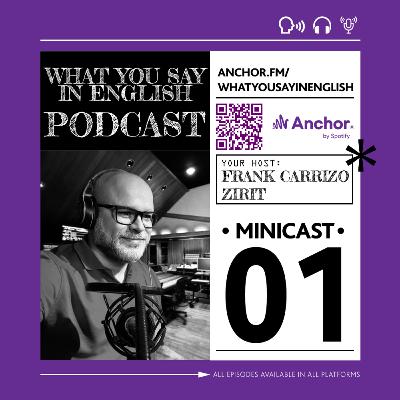
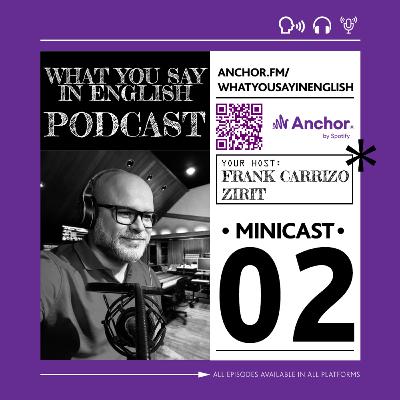

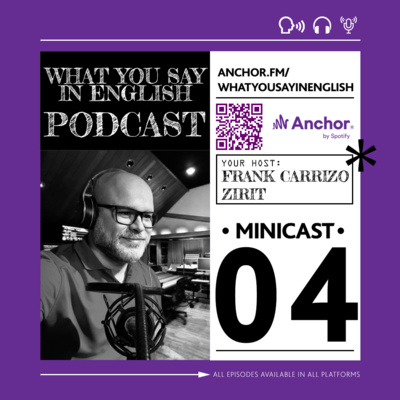
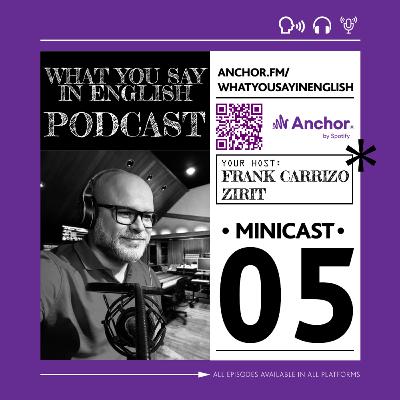
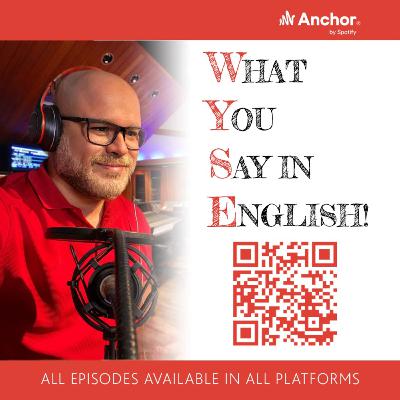



Hi Frank, Cambridge dictionary says it's invest IN sth, not ON smth. Can you please clarify is it Br/Am English difference?